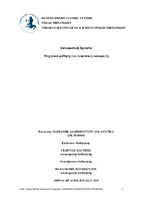| dc.contributor.advisor | Χλούπης, Γεώργιος | |
| dc.contributor.advisor | Photopoulos, Panagiotis | |
| dc.contributor.author | Αδαμοπούλου-Σουλαντίκα, Μαριάνθη | |
| dc.date.accessioned | 2023-07-26T14:49:57Z | |
| dc.date.available | 2023-07-26T14:49:57Z | |
| dc.date.issued | 2023-07-19 | |
| dc.identifier.uri | https://polynoe.lib.uniwa.gr/xmlui/handle/11400/4857 | |
| dc.identifier.uri | http://dx.doi.org/10.26265/polynoe-4695 | |
| dc.description.abstract | In recent years, Deep Learning has drawn a lot of interest from the geophysical community. It can be used for a variety of geophysical employments, by providing simpler and easier solutions to problems. It addresses problems to do with excessive need of computational resources and time consumption from large amounts of data, as well as the curse of dimensionality. Over the years there has been great progress with Deep Learning methods. An advantage of using Deep Learning in certain applications is that it allows its users to use remote sensing, so they can collect and analyze data even from places that are difficult to be approached by humans. With the help of TensorFlow and Keras libraries, Deep Learning plays a part in the improvement of exploring surrounding environments. | el |
| dc.format.extent | 82 | el |
| dc.language.iso | en | el |
| dc.publisher | Πανεπιστήμιο Δυτικής Αττικής | el |
| dc.rights | Αναφορά Δημιουργού - Μη Εμπορική Χρήση - Παρόμοια Διανομή 4.0 Διεθνές | * |
| dc.rights.uri | https://creativecommons.org/licenses/by-nc-sa/4.0/deed.el | * |
| dc.subject | Μηχανική μάθηση | el |
| dc.subject | Βαθιά μάθηση | el |
| dc.subject | Σεισμοί | el |
| dc.subject | TensorFlow | el |
| dc.subject | Keras | el |
| dc.subject | Γεωφυσική | el |
| dc.subject | Μοντέλα βαθιάς μάθησης | el |
| dc.subject | Machine learning | el |
| dc.subject | Deep learning | el |
| dc.subject | Earthquake | el |
| dc.subject | Geophysics | el |
| dc.title | Machine learning for geophysical applications | el |
| dc.title.alternative | Μηχανική μάθηση για γεωφυσικές εφαρμογές | el |
| dc.type | Διπλωματική εργασία | el |
| dc.contributor.committee | Moutzouris, Konstantinos | |
| dc.contributor.faculty | Σχολή Μηχανικών | el |
| dc.contributor.department | Τμήμα Ηλεκτρολόγων και Ηλεκτρονικών Μηχανικών | el |
| dc.description.abstracttranslated | Τα τελευταία χρόνια, η Βαθιά Μάθηση έχει συναντήσει μεγάλο ενδιαφέρον στην γεωφυσική κοινότητα. Εφαρμόζεται σε πολλές γεωφυσικές εφαρμογές, καθιστώντας ευκολότερη την επίλυση προβλημάτων. Αντιμετωπίζει προβλήματα μεγάλης κατανάλωσης υπολογιστικών πόρων και χρόνου, για μεγάλο όγκο δεδομένων καθώς και την κατάρα της διαστατικότητας. Με τα χρόνια, έχει υπάρξει πρόοδος στις μεθόδους της. Ένα πλεονέκτημα που παρέχει η χρήση της, είναι ότι επιτρέπει στους χρήστες της την χρήση τηλεσκόπισης, για την απόκτηση και ανάλυση δεδομένων ακόμα και από δύσβατες για τον άνθρωπο περιοχές. Η Βαθιά Μάθηση με την βοήθεια των βιβλιοθηκών TensorFlow και Keras, έχει λάβει μέρος στην βελτίωση της ανακάλυψης του περιβάλλοντα χώρου. | el |


